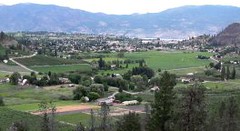Source: SmartGrowthBC from StatsCan2003
For the first time since 1990, families with relatively large farm operations relied on off-farm sources for more than half of their total income - joining the ranks of families with small- and medium-sized farms who have relied on off-farm income for the majority of their income for several years. Families operating Canada's largest farms are now the only ones that continue to rely on farm sources for more than half of their total income.
Families operating small farms, that is, those with revenues from $10,000 to$49,999, have consistently relied on off-farm sources for most of their total income. Between 1990 and 2003, the percentage of total income from off-farm sources ranged from 87.1% to 92.6%. Families operating medium-size farms (with revenues from $50,000 to $99,999) have also relied on off-farm sources for most of their total income.
From1990 to 2003, medium-size farms have grown increasingly reliant on off-farmincome. Off-farm income represented 66.3% of the total income of these families in 1990, but 90.0% in 2003. For families with large farm operations (annual revenues from $100,000 to$499,999), the portion of total income from off-farm sources has also grown steadily. In 1990, 37.3% of income came from off-farm sources. By 2003, 52.1% of total income came from off-farm sources.
Families with the very largest farms (with revenues of $500,000 and over) are the sole exception to the trend. The proportion of these families'annual incomes from off-farm sources has remained relatively stable, rangingbetween 25.9% and 33.5% since 1990.
In 2003, average total income of farm families operating large farms declined for the second time since the beginning of the data series in 1990. The drop occurred because the 1.8% increase in average off-farm income andthe 39.6% jump in average net program payments were not sufficient to offset the 42.0% drop in average net market income. Among the main factors behind the drop in average net market income were back-to-back droughts in 2001 and 2002, and the closure of the border to live cattle exports after the diagnosis of the bovine spongiformencephalopathy (BSE) in a cow in northern Alberta in 2003.
Once adjusted for capital cost allowance, average net market income of farm families operating large business-focused farms dropped to a deficit of $6,843. Other factors behind the drop in net market income include higher expenses for fertilizer and lime, pesticides, custom work and machine rental,machinery fuel, machinery repairs, licenses and insurance, and higher netinterest expenses.
Note: The analysis in this release pertains specifically to families operating business-focused farms. The release of these aggregate administrative data and its companion analysis are funded by Agriculture andAgri-food Canada to complement survey-based sources of farm financial income. Although administrative-based data are released later than their survey-based counterparts, these data help provide a more comprehensive picture of farm operations and provide additional annual historical insight into changes over time in farm family reliance on off-farm income.

